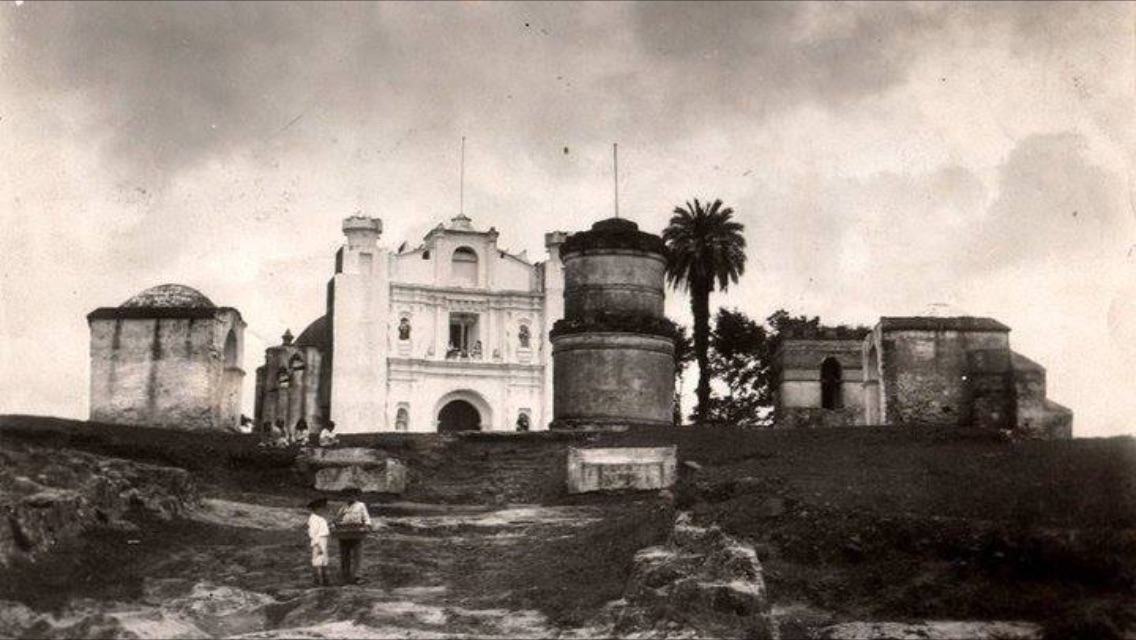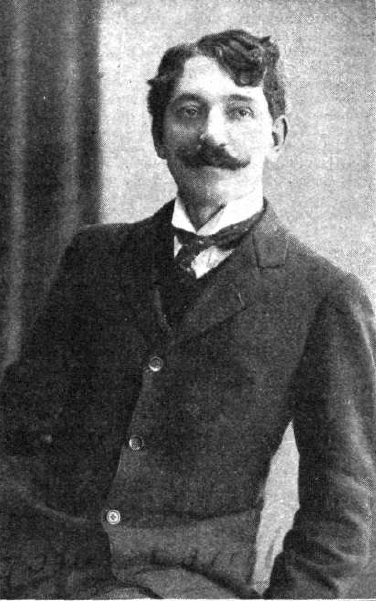|
Carrera Theater (Guatemala)
The Carrera Theater -also called Colón Theater after the Liberal Reform of 1871– was a majestic classic Greek style theater built by president Captain General Rafael Carrera y Turcios in Guatemala City, Guatemala in 1852. The building was in the Old Central Square and after the liberal revolution of 1871 it was called National Theater. Towards the end of general Manuel Lisandro Barillas Bercián government, the building was remodeled to celebrate the Discovery of America fourth centennial anniversary. Finally, the theatre was destroyed by the earthquakes of 1917–18 and demolished in 1923. Construction An enthusiastic fan of Opera, and following his mistress -Josefa Silva's advice "Ms. Silva was a professional actress and singer who had taught Rafael Carrera how to behave, write, read and sing."-, president for life of Guatemala Rafael Carrera started the construction of a massive National Theater that was called "Carrera Theater" in his honor, and was located in ... [...More Info...] [...Related Items...] OR: [Wikipedia] [Google] [Baidu] |
Guatemala City
Guatemala City ( es, Ciudad de Guatemala), known locally as Guatemala or Guate, is the capital and largest city of Guatemala, and the most populous urban area in Central America. The city is located in the south-central part of the country, nestled in a mountain valley called Valle de la Ermita ( en, Hermitage Valley). The city is the capital of the Municipality of Guatemala and of the Guatemala Department. Guatemala City is the site of the Mayan city of Kaminaljuyu, founded around 1500 BC. Following the Spanish conquest, a new town was established, and in 1776 it was made capital of the Kingdom of Guatemala. In 1821, Guatemala City was the scene of the declaration of independence of Central America from Spain, after which it became the capital of the newly established United Provinces of Central America (later the Federal Republic of Central America). In 1847, Guatemala declared itself an independent republic, with Guatemala City as its capital. The city was originally located ... [...More Info...] [...Related Items...] OR: [Wikipedia] [Google] [Baidu] |
José Batres Montúfar
José Batres Montúfar (1809–1844) was a Guatemalan poet, politician, engineer and military figure. Monument In 1852, Juan Matheu and Manuel Francisco Pavón Aycinena presented Rafael Carrera with a plan to build a majestic National Theater, that would be called Carrera Theater in his honor. Once approved, Carrera commissioned Matheu himself and Miguel Ruiz de Santisteban to build the theater. Initially it was in charge of engineer Miguel Rivera Maestre, but he quit after a few months and was replaced by German expert José Beckers, who built the Greek façades and added a lobby. This was the first monumental building ever built in the Republican era of Guatemala, given that in the 1850s the country finally was enjoying some peace and prosperity. Appleton's Guide to México and Guatemala of 1884 describes the theater as follows: «In the middle of the square is the Theater, similar in size and elegance to any of the rest of Spanish America. Lines of orange trees an ... [...More Info...] [...Related Items...] OR: [Wikipedia] [Google] [Baidu] |
Theatres In Guatemala
Theatre or theater is a collaborative form of performing art that uses live performers, usually actors or actresses, to present the experience of a real or imagined event before a live audience in a specific place, often a stage. The performers may communicate this experience to the audience through combinations of gesture, speech, song, music, and dance. Elements of art, such as painted scenery and stagecraft such as lighting are used to enhance the physicality, presence and immediacy of the experience. The specific place of the performance is also named by the word "theatre" as derived from the Ancient Greek θέατρον (théatron, "a place for viewing"), itself from θεάομαι (theáomai, "to see", "to watch", "to observe"). Modern Western theatre comes, in large measure, from the theatre of ancient Greece, from which it borrows technical terminology, classification into genres, and many of its themes, stock characters, and plot elements. Theatre artist Patrice ... [...More Info...] [...Related Items...] OR: [Wikipedia] [Google] [Baidu] |
History Of Guatemala
The history of Guatemala begins with the Maya civilization (300 BC – 250 AD), which was among those that flourished in their country. The country's modern history began with the Spanish conquest of Guatemala in 1524. Most of the great Classic-era (250 – 900 AD) Maya cities of the Petén Basin region, in the northern lowlands, had been abandoned by the year 1000 AD. The states in the Belize central highlands flourished until the 1525 arrival of Spanish conquistador Pedro de Alvarado. Called "The Invader" by the Mayan people, he immediately began subjugating the Indian states. Guatemala was part of the Captaincy General of Guatemala for nearly 330 years. This captaincy included what is now Chiapas in Mexico and the modern countries of Guatemala, El Salvador, Honduras, Nicaragua and Costa Rica. The colony became independent in 1821 and then became a part of the First Mexican Empire until 1823. From 1824 it was a part of the Federal Republic of Central America. ... [...More Info...] [...Related Items...] OR: [Wikipedia] [Google] [Baidu] |
Carlos Herrera
Carlos Herrera y Luna (26 October 1856 – 3 July 1930) was a Guatemalan politician who served as acting President of Guatemala from 30 March 1920 to 15 September 1920, and President of Guatemala from 16 September 1920 until 10 December 1921. Biography Business Herrera Luna was a successful sugar business man, developing Pantaleón Sugar Mill in Santa Lucía Cotzumalguapa, and Concepción and El Baúl sugar mills in Escuintla in the early 1900s. Pantaleón Sugar Holdings is today one of the top 10 sugar companies in America, with mills in Central and South America. Presidency After Manuel Estrada Cabrera was overthrown on April 14, 1920, the Unionist Party leaders, who were mostly conservatives, dealt with the liberal leaders from the Cabrera's regime such that they could appoint the new cabinet. However, the liberal leaders outsmarted the conservatives and appoint Herrera Luna in office, in spite that he had served as a liberal representative for the whole 22 ye ... [...More Info...] [...Related Items...] OR: [Wikipedia] [Google] [Baidu] |
José María Orellana
José María Orellana Pinto (11 July 1872 – 26 September 1926) was a Guatemalan political and military leader. He was chief of staff of President Manuel Estrada Cabrera and President of Guatemala between 1921 and 1926, after overthrowing Conservative Unionist President Carlos Herrera. During his rule the Quetzal was established as the currency of Guatemala. Orellana Pinto died under suspicious circumstances in 1926 at the age of fifty-four. He was buried in the Guatemalan capital with state honors. Early life José María Orellana Pinto was born in El Jícaro; he was the son of Esteban Orellana and Leonora Pinto. Orellana had a military career becoming General of the Guatemalan Army. He was elected to the Guatemalan legislature on several occasions, as a member of the Liberal Party, and was also Chief of Staff of the President Estrada Cabrera; when serving as such, on 29 April 1907, he was riding alongside the president's coach when the latter suffered a bomb attack -which ... [...More Info...] [...Related Items...] OR: [Wikipedia] [Google] [Baidu] |
Manuel Estrada Cabrera
Manuel José Estrada Cabrera (21 November 1857 – 24 September 1924) was the President of Guatemala from 1898 to 1920. A lawyer with no military background, he was a strong ruler (dictator) who modernised the country's industry and transportation infrastructure, but only via granting concessions to the American-owned United Fruit Company, whose influence on the government was deeply unpopular among the population. Estrada Cabrera used increasingly brutal methods to assert his authority, including armed strike-breaking, and he effectively controlled the general elections. He retained power for 22 years through controlled elections in 1904, 1910, and 1916, and was eventually removed from office when the national assembly declared him mentally incompetent, and he was jailed for corruption. Background Estrada Cabrera was a lawyer. He studied at the Universidad Nacional and thanks to his work he reached the position of "First Designated for the Presidency" when José María Rei ... [...More Info...] [...Related Items...] OR: [Wikipedia] [Google] [Baidu] |
Christopher Columbus
Christopher Columbus * lij, Cristoffa C(or)ombo * es, link=no, Cristóbal Colón * pt, Cristóvão Colombo * ca, Cristòfor (or ) * la, Christophorus Columbus. (; born between 25 August and 31 October 1451, died 20 May 1506) was an Italian explorer and navigator who completed Voyages of Christopher Columbus, four voyages across the Atlantic Ocean sponsored by the Catholic Monarchs of Spain, opening the way for the widespread European Age of Discovery, exploration and colonization of the Americas. His expeditions were the first known European contact with the Caribbean, Central America, and South America. The name ''Christopher Columbus'' is the anglicisation of the Latin . Scholars generally agree that Columbus was born in the Republic of Genoa and spoke a dialect of Ligurian (Romance language), Ligurian as his first language. He went to sea at a young age and travelled widely, as far north as the British Isles and as far south as what is now Ghana. He married Port ... [...More Info...] [...Related Items...] OR: [Wikipedia] [Google] [Baidu] |
Teatro Carrera Acuarela
Teatro may refer to: * Theatre * Teatro (band) Teatro, Italian for "theatre", is a vocal group signed to the Sony BMG music label. The members of Teatro are Jeremiah James, Andrew Alexander, Simon Bailey and Stephen Rahman-Hughes. Band members Jeremiah James Jeremiah James was born in upst ..., musical act signed to Sony BMG * ''Teatro'' (Willie Nelson album), 1998 * ''Teatro'' (Draco Rosa album), 2008 {{disambiguation ... [...More Info...] [...Related Items...] OR: [Wikipedia] [Google] [Baidu] |
Rafael Carrera
José Rafael Carrera y Turcios (24 October 1814 – 14 April 1865) was the president of Guatemala from 1844 to 1848 and from 1851 until his death in 1865, after being appointed President for life in 1854. During his military career and presidency, new nations in Central America were facing numerous problems: William Walker's invasions, liberal attempts to overthrow the Catholic Church and aristocrats' power, the Civil War in the United States, Mayan uprising in the east, Belize boundary dispute with the United Kingdom, and the wars in Mexico under Benito Juarez. This led to a rise of caudillos, a term that refers to charismatic populist leaders among the indigenous people. Backed by the Catholic Church, conservatives of the Aycinena clan led by Juan José de Aycinena y Piñol, and mestizo and indigenous peasants, he dominated politics in the first three decades of Guatemala's independence more than any other individual. He led the revolt against the liberal state government ... [...More Info...] [...Related Items...] OR: [Wikipedia] [Google] [Baidu] |









